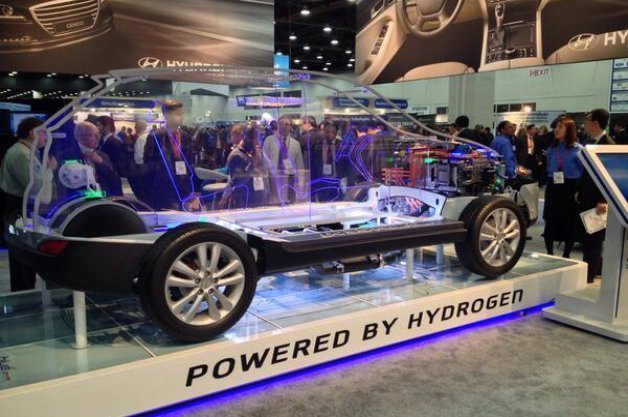Hyundai Tucson Fuel Cell CUV Deliveries Running Behind Schedule

Speaking with Hyundai's Kevin Lee at the Hyundai booth at the SAE World Congress this week, we learned that deliveries are now going to happen closer to a month from now.
Lee told AutoblogGreen that the first US-bound units will be shipped from South Korea at the end of April or beginning of May but there is no actual date set for the first customer delivery. He said he expects 100 or fewer H2 powered Tucson CUVs to be operating in the US by the end of this year, all of them in Southern California. He said the customers in this first batch are being selected based on the location of the nearest hydrogen fuel station. While the number of stations is small today, more are on the way. Globally, there are roughly 70-100 of these hydrogen-powered CUVs (also known as the ix35) running in customer hands today, in places like South Korea, Germany, Norway, Austria and Italy.
In the US, the Tucson Fuel Cell CUV leases for $499 a month (with $2,999 down) for 36 months, and comes with unlimited hydrogen refueling as well as Hyundai's Valet Maintenance. Lee told us that one reason for the "free" hydrogen is that even the small number of public hydrogen stations out there (nine in SoCal) does not have a cohesive set of rules for how to sell H2 to the public. The stations are not yet certified to charge customers based on dollar per kilogram in California, Lee said, since that regulation has not yet been set by the Division of Measurement Standards (DMS). Currently, "each station is different," he said, with some charging Hyundai a flat rate per fill and others charging the automaker a general station maintenance fee. This situation will likely change by the end of the year, he said.
Lee said Hyundai is already busy working on the next-gen fuel cell vehicles and trying to reduce costs but was not able to share any details. The one thing he did say was that things are "going well" and that it was "currently under discussion at a very high level" whether or not these fuel cell vehicles will be subject to shorter development time than standard vehicles. In other words, if you don't like the Tucson Fuel Cell SUV today, a newer and better version might be here sooner than expected.
Nouvelles connexes


